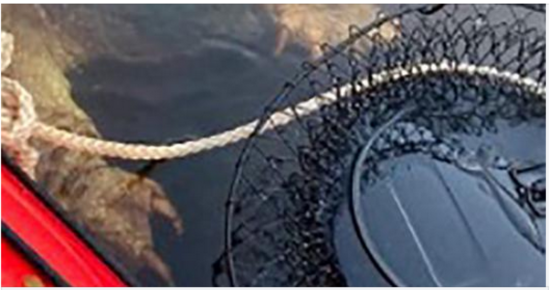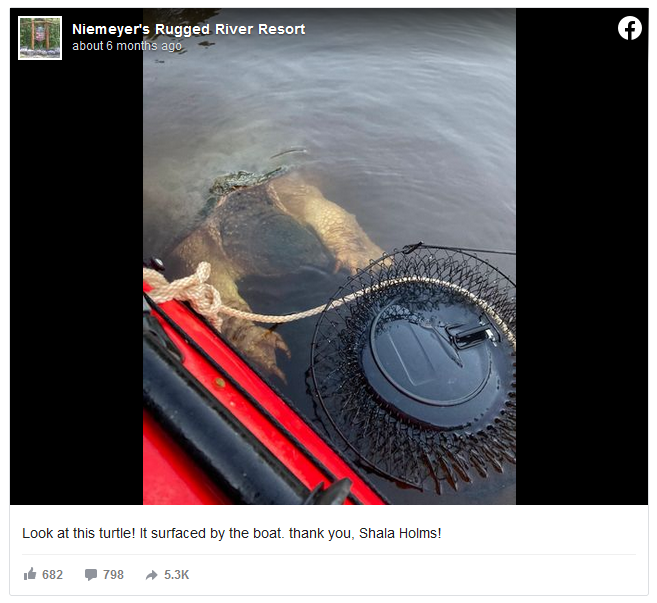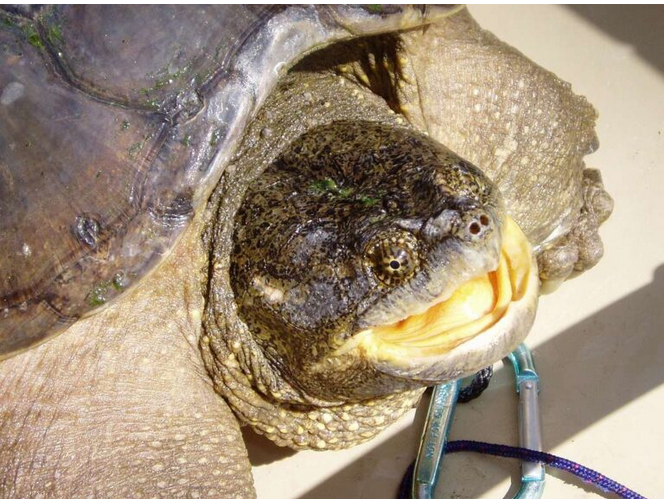
Authorities have reassured the people not to be concerned despite the fact that the monster was seen and recorded in the Mississippi River.
What would you have done if you had been standing just a few feet away from this enormous beast in the water?
Continue reading to learn how one woman responded and why she didn’t anticipate her tale becoming so well-known.

Shala Holm was born in Buffalo, Minnesota. Shala came upon a large snapping turtle months ago, but it wasn’t until lately that her photo gained widespread attention.
The turtle’s head, which resembles Godzilla, is leading the way as its huge claws stretch into a net of fish. From the image alone, it is obvious that this turtle is bigger than others.
This past summer, Shala was spending time with her family at Niemeyer’s Rugged River Resort close to Brainerd. When Holm and her daughter initially came across the animal, they were both in a tandem kayak.
“My daughter all of a sudden said, ‘Mom, be quiet. I can hear something breathing,’” Holm recounted.
Holm was astonished to see the turtle’s nose heading towards a fish basket that hung from their kayak as she turned to search for something more common at the shore.

“He kind of clawed onto it,” she said. “He was so big, and we were so startled.”
Holm shook the basket to frighten the turtle away, and it swam away.
The mother and daughter returned to the location the following day in their kayak to see if they could locate it again to take a picture. Catching fish while waiting for the turtle to return was their pass time.
“When you’re in a kayak, the beauty of it is you’re really close to the water,” Holm said. “So we were really quite close.”
Though they were unsure of the actual size of the reptile in the water, the mother and daughter were reasonably positive that it was a snapping turtle and that its legs were around the size of Holm’s wrists.
Adult snapping turtles typically measure between 8 and 14 inches long and weigh between 10 and 35 pounds, according to the state Department of Natural Resources. The largest turtle ever discovered in Minnesota weighed an amazing 65 pounds!
Shala emailed the image to the DNR so they could gather further details. They estimated that the turtle was at least 15 years old and possibly as old as 30.
After the resort’s proprietors decided to share Shala’s photo on their Facebook page, it quickly became popular. The resort’s owners, Corby and Sheila Niemeyer, have observed as the post received thousands of shares and nearly a thousand comments. Even media organizations interested in the subject have been in touch with Sheila.
“Most of them are like, is this really real?” she said. “It really is.”
According to the resort owner, the resort’s location is on a quiet, slow section of the Mississippi north of Brainerd. They often see a variety of local wildlife there.
“Every June, we get a lot of turtles coming up on shore and they’re laying their eggs,” she said. “It’s one of our things we love is watching the turtles. So this was pretty crazy to see a big one like that.”
Many Facebook users have advised staying away from the water, but Sheila has clarified that it’s not as risky as it seems.

“I think if you were to really look at any lake or river, you’re going to find all kinds of things you never thought of,” she said. “They leave you alone. They don’t want to be by you.”
In fact, she is hoping that the popularity of the post will help them to get more guests at their resort.
“I’m hoping it won’t be something negative because they think. ‘Oh my gosh, I’ll never go there. I don’t want to swim with that,’” she said. “For the most part, I don’t think you need to worry about that. But seeing the wildlife is just amazing.”
The Minnesota DNR’s Erica Hoaglund, a regional nongame wildlife specialist, claims that snapping turtles are frequently misunderstood because they appear “scary” and defend themselves when they sense danger. She claims they are not hazardous.
They are most at ease in the water and frequently make an effort to appear more terrifying on land, where they feel more exposed. They may protect themselves out of fear, but they never engage in combat.
“They really just want to avoid being encountered, and will hide and flee if given half a chance,” Hoaglund said.